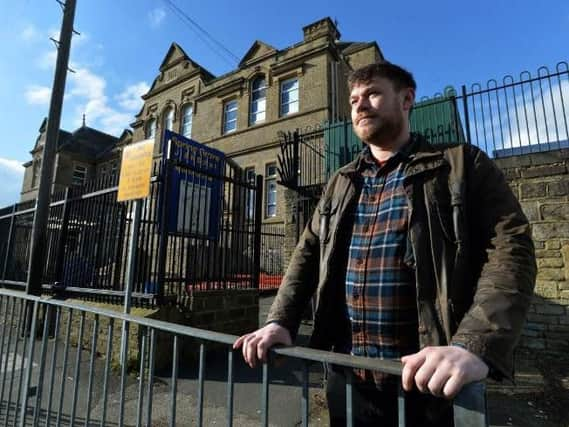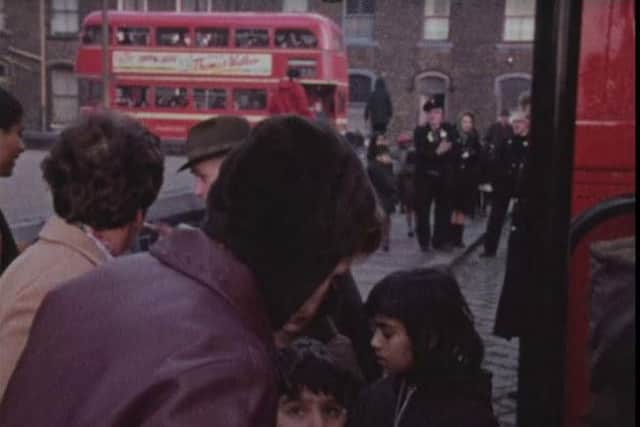Shocking history of Huddersfield's immigrant 'bussing' policy revealed in new film


Their families came to Yorkshire in the 1960s and 1970s from across the world to seek new lives and often to help staff the region’s textile mills that were driving the British economy. But the children of immigrants from Commonwealth countries like India, Pakistan and the Caribbean islands faced widespread discrimination and racism; exacerbated by a controversial policy of “bussing” them out of the local areas where their families had settled to schools that in some cases could be over an hour away.
Around a dozen local authorities across England are known to have decided there should be no more than 30 per cent of immigrants at any one school and children would have to be taken elsewhere by bus once the quota was reached. Three of the councils to adopt the controversial policy were Huddersfield, Bradford and Halifax.
Advertisement
Hide AdAdvertisement
Hide AdIt was supposedly introduced with the best of intentions - officially designed to help young people often with limited English learn the language more quickly and integrate into the new society they found themselves in. But shocking new evidence laid out in an award-winning new documentary by Huddersfield historian Joe Hopkinson highlights the racist attitudes from some educational decision-makers at the time.


The 25-minute film also explains the emotional impact the policy had on many immigrant children, especially as they were often segregated and taught away from white pupils in church halls and working men’s clubs when they arrived at their new schools.
Huddersfield Education Committee minutes from the mid-1960s unearthed by Hopkinson discussed how local headteachers had met to discuss “the most effective ways of dealing with immigrant children with a view to their earliest possible integration into normal classes, and submitted recommendation that the problems of Asiatic and West Indian pupils should be treated separately”.
Shockingly, the minutes go on to give the stated reason for bussing black children, many of whom already spoke English as their first language, around Huddersfield as the belief they were more likely to suffer from “educational retardation”. The minutes add: “In order to expedite their integration into normal classes and at the same time avoid excessive difficulties with the remedial work of schools, it is necessary that their admission to schools should be so controlled that no school receives more than a small proportion of West Indians.”
Advertisement
Hide AdAdvertisement
Hide AdThe impact of splitting up black children from each other for this reason is highlighted in the film as a former teacher recounts a heartbreaking occasion where a black child used white chalk to cover his face so he would better fit in with the others in his school. She said: “You could just see his eyes and his mouth. He was so proud and said ‘I’m white now, I’m not a black boy, I’m white now’.”


Hopkinson’s powerful film, focused on his home town of Huddersfield, includes interviews with people who were ‘bussed’ as children, as well as two of the teachers who were tasked with implementing the policy. Made over ten months as part of his PhD at the University of Huddersfield in which the 28-year-old examines the experiences of Commonwealth immigrant children in Britain between the 1960s and 1980s, the documentary has recently been named as the winner of a Royal Historical Society award.
He says the project started out after having conversations with older relatives who remembered buses of immigrant children arriving at their primary schools in the 1960s. “Asian children would get off the bus and white children would throw stick and stones at them, they wouldn’t engage with them at playtime and barely had any lessons together.”
Hopkinson says researching the topic has been an eye-opening experience. “I think to be honest when I started the research I was very naive and overly optimistic about how society seems multicultural now and thought it must have been getting better back then. The more research I did, the less optimistic I felt. The stories of how the first generation of Commonwealth immigrants were treated is shocking. These children were black and Asian and they were put on the buses; if you were white, you might not have even heard about it as it didn’t affect you.
Advertisement
Hide AdAdvertisement
Hide Ad“If you accepted bussed children as a school, you received an extra teacher. Then the headteachers could decide where those children were educated. It was common for them to use church buildings and other buildings such as working men’s clubs. The children were literally checked for disease and somebody would question them and test their level of English. It seems there was a lot of prejudice in the assessments and teachers couldn’t be bothered to learn the names of the children properly.”
Hopkinson says uncovering the Education Committee minutes had been an important moment in his research. “Part of your job as a historian is to search through page after page of references and see if anything catches your eye. The minutes were just sat there in Huddersfield library. It was a shock but proof of what I had been looking for. You feel like an archaeologist brushing the ground and eventually you find the arrowhead you have been searching for.”
But Hopkinson says while the logic used to justify the policy was shocking by today’s standards, his research indicates many involved in implementing it were genuinely acting with “good intentions”. One of those interviewed for the film was former headteacher Trevor Burgin, who helped to form the first national association for multiracial education. Now deceased, he says in the film there had previously been no system for dealing with the arrival of immigrant children in schools who could not speak English. He said in his mind the policy was brought in with “a lot of love” to try to make things better both for indigenous English children and the new arrivals.
The policy was phased out nationally by 1980 after complaints it was racially motivated. But there have been renewed calls in recent years to introduce something similar once again.
Advertisement
Hide AdAdvertisement
Hide AdIn 2012, David Levin, head of the private City of London School for boys, suggested children from inner city estates could be driven to schools in wealthier areas to tackle “social segregation”. Four years later, former chair of the Equality and Human Rights Commission Trevor Phillips called for the limiting the presence of any ethnic minority group in schools to no more than 50 per cent to improve integration; an idea Hopkinson says it is a direct echo to ‘bussing’.
Hopkinson is now widening out his research for a second film, which will examine more widely the experiences of the first generations of Commonwealth immigrant children in the North, with a particular focus on Huddersfield and Liverpool.
“I’d like to interview anyone that might have useful information but I especially want to meet people who migrated to Britain, or whose parents had recently arrived before they were born, about their experiences at school during that period.”
To contact him, email [email protected].
'Bussed' children helped to make film
Adults who were subject to ‘bussing’ policies help Hopkinson in the making of his film.
Advertisement
Hide AdAdvertisement
Hide AdHopkinson tracked down interview subjects through an appeal in the local paper, as well as handing out flyers to local community groups and mosques.
He says it was a privilege to be able to hear and tell their stories, with the participants helping him co-produce the film. “From the very beginning, this project was supposed to be about them. They had something that was very worthwhile hearing. It was amazing doing the interviews with them.”
Hopkinson says he was surprised and proud to win the Royal Historical Society Award for his film, which was made with the assistance of Kirklees Local TV and D5 Media.